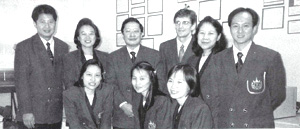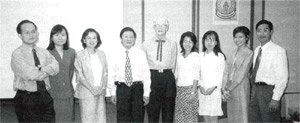|
The
Achievements of Professor Dr. M.R.
Jisnuson Svasti
Professor
Dr. M.R. Jisnuson Svasti has dedicated
30 years of his life to the study
of protein structure and funcion.
This study is important, because protein
molecule are the instruments for expressing
the genetic information of living
organisms, so that understanding the
structure and function of proteins
is vital for the understanding of
living processes. Over the years,
Professor Dr. M.R. Jisnuson Svasti
has studied various proteins from
both animals and plants, as well as
from different tissues. These include
the plasma proteins, proteins specific
to the male reproductive system, proteins
changed in humen diseases, and enzymes
from plants.

In terms of plasma proteins, the
immunoglobulins were the first proteins
he studied. These proteins are involved
in the antibody system of the body,
which binds with foreign substance.
Professor Dr. M.R. Jisnuson Svasti's
work provided information on how parts
of the molecule are conserved, so
that they can perform a similar function,
and how parts differ between different
antibodies, giving rise to specificity
in binding. He has also worked on
human plasma vitamin D-binding protein,
elucidating the structural basis for
their polymorphism, as well as showing
that the binding of vitamin D changes
the conformation of the protein.
He has studied various proteins
and enzymes that are specific to the
male reproductive system, and provided
information on their structure and
action. These include sperm protamine,
testis-specific histone, sperm LDH
isozyme X, and seminal plasma acidic
proteinase. This work has help to
improve the understanding of the male
reproductive process. Such knowledge
is essential for the design of protential
male contraceptive agents.
He has discovered many abnormal
hemoglobins (Hb), which have not previously
been found in Thailand. Hemoglobin
is a protein, which functions to transport
oxygen from the lung to peripheral
tissues. These are two types of Hb
disease, thalassemia, due to decrease
or lack of synthesis of Hb chains,
and abnormal Hb, due to mutation in
structure. Professor Dr. M.R. Jisnuson
Svasti's laboratory is the best equipped
in Thailand for analysis of abnormal
Hb. by using protein studies and DNA
studies. Such study not only provides
insight into protein structure-function
relationship, but is also important
in diagnosis of the disease.
Professor Dr. M.R. Jisnuson Svasti
has discovered novel glycosidase enzymes
from Thai plants, and studied their
abilities to synthesize oligosaccharides.
Thai Rosewood ß-glucosidase,
named dalcochinase, was characterised,
including purifidation, proties, cloning,
espression and structure determination,
as well as its application in reverse
hydrolysis and glucose transfer reactions.
Other ß-blucosidases have studied
including cassava linamarase. These
studies provide information about
the potential use of ß-blucosidase
enzymes for making useful carbohydrate
compounds.

In these studies Professor Dr. M.R.
Jisnuson Svasti has used a variety
of techniques and approaches, and
his laboratory at the Chulabhorn Research
Institute is the most complete laboratory
for the study of protein primary structure
in Thailand, with capabilities for
amino acid analysis, HPLC separation
of peptides, protein sequencing and
two-dimensional eletrophoresis. He
has also used various techniques for
studying protein conformation, such
as intrinsic fluorescence and circular
dischroism spectroscopy. In addition, the
Center for Excellence in Protein Structure
and Function at Mahidol University
has facilities for determining the
three-dimensional structure of proteins
by X-ray diffraction.
Apart from his work on protein structure
and function, Professor Dr. M.R. Jisnuson
Svasti is also interested in biochemical
education, and has published several
papers in international educational
journals. He has also assisted the
development of research in Thailand
as Editor of the Journal of the Science
Society of Thailand for two terms,
and as Chairman of the Biochemical
Section, Science Society of Thailand.
Most importantly, he has promoted
interational cooperation, by playing
important roles in international organisations,
such as President of the Federation
of Asian and Biochemistes, Symposium
Committee of the International Union
of Biochemistry and Molecular Biology,
and Membership Committee for Biochemistry
and Biophysics, Third World Academy
of Science. |

